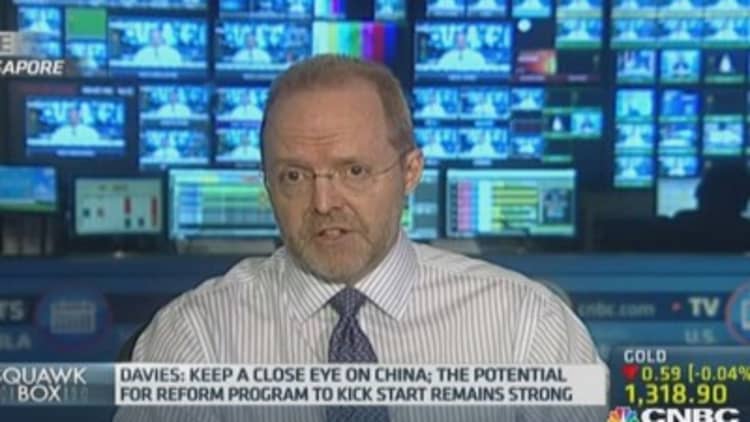
Europe's economy has dragged itself out of the darkest depths of its crisis, spurring a rush into the region's stock markets, but some analysts are questioning whether the rally has outpaced the economy's recovery.
"The underlying strength of Europe is not that robust," despite its economy exiting recessionary territory this year, Piyush Gupta, CEO of DBS Group, Southeast Asia's largest bank, said at an event for private banking clients last week. "The markets are running ahead of themselves."
Read More Why US stocks aren't overvalued, yet
While the drop in government bond yields in peripheral countries is positive, the decline is likely overdone on the back of liquidity and easing measures from the European Central Bank (ECB), he said.
Yields on are around 2.69 percent, while are around 2.86 percent, not far off their all-time low of 2.69 percent touched in June, compared with both countries seeing levels over 7.0 percent in early 2012. Portugal's 10-year bond yield is around 3.6 percent, compared with more than 15 percent in early 2012.
Read More DBS CEO: US market outlook confusing
"If you look at all these quantitative assessment tests, the stress tests that the banking system is going through in the second half of the year, there is going to be choppiness in the European market," Gupta said.
It's not a consensus view, with many fund managers clearly bullish on Europe. A net 43 percent of global fund managers are overweight on Eurozone stocks, the highest in seven months and the second highest level since July of 2007, according to the Bank of America-Merrill Lynch survey of fund managers for June.
Mutual funds and exchange traded funds (ETFs) focused on developed Europe have seen $56.37 billion worth of inflows so far this year, according to data from Jefferies.
But Gupta isn't alone in his concerns over the Europe market rally. Nomura cut its view on Europe equities to neutral from overweight this week.
"We were wrong to expect such a fast recovery," Nomura said in a note last week.
Read More Euro zone's richest investors cash in on stocks
Rather than a recovery in earnings, 12-month forward forecasts for European company earnings have actually contracted by 1 percent since January, Nomura said. The bank is now forecasting 5 percent earnings growth for the year, compared with a 14 percent forecast at the beginning of the year.
"We are at the stage in the cycle where we think earnings have to lift the market higher as there is little scope for multiple expansion," it said.

There are other signs that confidence in the trade is slipping.
The Bofa survey found a net 6 percent of European fund managers see the region's equities as overvalued, the highest since the valuation bubble in 2000. Global fund managers' conviction on the trade has also been waning, with a net 21 percent expecting to be overweight Europe stocks on a 12-month view, down from a 40 percent reading in February, the Bofa survey found.
To be sure, Nomura noted that it is only disappointed with the pace of recovery.
"We are 'pushing out' our modest earnings optimism into the future, rather than bailing on this call altogether," Nomura said. "We still expect a positive return in absolute terms and from an asset allocation perspective still prefer European equities to European government bonds."
It maintains its index target for Europe ex-U.K., suggesting 7 percent upside from here through the end of the year.
Others are sticking with the trade, but with some misgivings.
Read More Fund managers see further gains for stocks
"There are occasions, unfortunately, when you've just got to run with the herd," Stephen Davies, CEO of Javelin Wealth Management, told CNBC.
"With the ECB showing absolutely no sign of changing its very accommodative approach, that definitely means you'll be benefiting from low interest rates, or effectively negative real interest rates for the foreseeable future," Davies said. "That's positive for banks. It's positive for the broader market in general."
—By CNBC.Com's Leslie Shaffer; Follow her on Twitter @LeslieShaffer1

